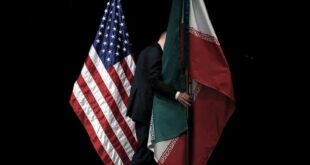 TEHRAN (FNA)- Tehran’s provisional Friday Prayers leader Ayatollah Akbar Hashemi Rafsanjani said that the West aims to bully nations seeking nuclear technology by creating obstacles to Iran’s civilian nuclear program, a senior cleric said.
TEHRAN (FNA)- Tehran’s provisional Friday Prayers leader Ayatollah Akbar Hashemi Rafsanjani said that the West aims to bully nations seeking nuclear technology by creating obstacles to Iran’s civilian nuclear program, a senior cleric said.
The superpowers believe a tough approach toward Tehran will intimidate third-world countries, Rafsanjani told a large congregation of worshippers on Tehran University Campus here on Friday.
“Such hostile acts are the oppression of both the Islamic Republic and the countries seeking civilian use of the technology,” he said according to press tv.
Rafsanjani added that “excuses” by certain powers have politicized Iran’s nuclear case.
“They hold a grudge against the Islamic Revolution and they seek to instead take it out on the Iranian nation,” continued the Chairman of the Assembly of Experts.
The United States and its Western allies accuse Iran of trying to develop nuclear weapons under the cover of a civilian nuclear program, while they have never presented any corroborative document to substantiate their allegations. Iran denies the charges and insists that its nuclear program is for peaceful purposes only.
Tehran stresses that the country has always pursued a civilian path to provide power to the growing number of Iranian population, whose fossil fuel would eventually run dry.
Iran is under three rounds of UN Security Council sanctions for turning down West’s calls to give up its right of uranium enrichment, saying the demand is politically tainted and illogical.
Iran has so far ruled out halting or limiting its nuclear work in exchange for trade and other incentives, saying that renouncing its rights under the NPT would encourage world powers to put further pressure on the country and would not lead to a change in the West’s hardline stance on Tehran.
Iran has also insisted that it would continue enriching uranium because it needs to provide fuel to a 300-megawatt light-water reactor it is building in the southwestern town of Darkhoveyn as well as its first nuclear power plant in the southern port city of Bushehr.
Iran has repeatedly said that it considers its nuclear case closed after it answered the UN agency’s questions about the history of its nuclear program.
The US is at loggerheads with Iran over the independent and home-grown nature of Tehran’s nuclear technology, which gives the Islamic Republic the potential to turn into a world power and a role model for other third-world countries. Washington has laid much pressure on Iran to make it give up the most sensitive and advanced part of the technology, which is uranium enrichment, a process used for producing nuclear fuel for power plants.
While Iran’s cooperation with the United Nations nuclear watchdog continues as Tehran aims to clarify the civilian nature of its nuclear program, the US and UK continue to threaten the country with further UNSC sanctions.
Washington’s push for additional UN penalties contradicted the report by 16 US intelligence bodies that endorsed the civilian nature of Iran’s programs. Following the US National Intelligence Estimate (NIE) and similar reports by the IAEA head – one in November and the other one in February – which praised Iran’s truthfulness about key aspects of its past nuclear activities and announced settlement of outstanding issues with Tehran, any effort to impose further sanctions or launch military action against Iran seems to be completely irrational.
The February report by the UN nuclear watchdog, the International Atomic Energy Agency, praised Iran’s cooperation in clearing up all of the past questions over its nuclear program, vindicating Iran’s nuclear program and leaving no justification for any new UN sanctions.
The UN nuclear watchdog has also carried out at least 14 surprise inspections of Iran’s nuclear sites so far, but found nothing to support West’s allegations.
West’s allegations continue, while the most recent report by the International Atomic Energy Agency (IAEA) also confirmed that there is no link between the use of nuclear material and the ‘alleged studies’ of weaponization attributed to Iran by the US.
Following the said reports by the US and international bodies, many world states have called the UN Security Council pressure against Tehran unjustified, demanding that Iran’s case must be normalized and returned from the UNSC to the IAEA.
US President George W. Bush finished a tour of the Middle East in winter to gain the consensus of his Arab allies to unite against Iran.
But hosting officials of the regional nations dismissed Bush’s allegations, describing Tehran as a good friend of their countries.
Bush’s attempt to rally international pressure against Iran has lost steam due to the growing international vigilance, specially following the latest IAEA and US intelligence reports.
 Eurasia Press & News
Eurasia Press & News


